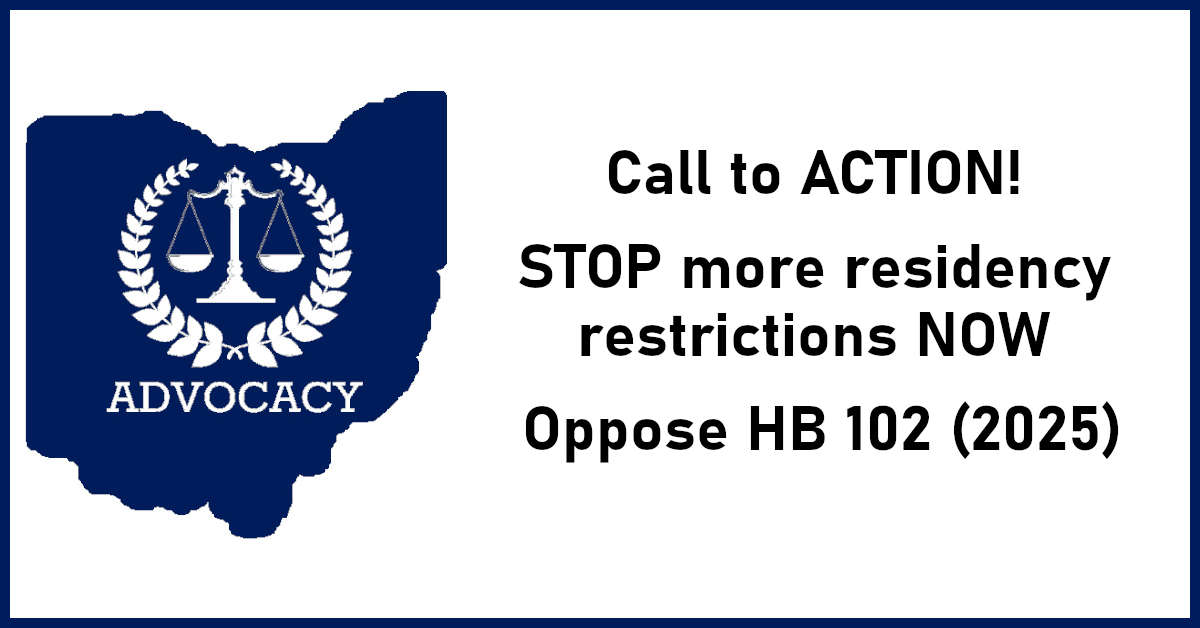Ohio House BIll HB 102 will expand housing and movement restrictions for Ohio citizens who are required to register as sex offenders.
1. Residency and Loitering Restrictions:
- Registered individuals may not live within 2,000 feet of their victim’s current
residence. - They are also prohibited from loitering within 1,000 feet of the victim’s home.
2. Expands who can bring civil injunctions. These restrictions can be enforced through civil injunctions initiated by:
- The victim or their landlord
- Nearby property owners or lessees
- Prosecutors, city/village solicitors, or other designated municipal legal authorities
3. Expanded Landlord Eviction Powers. Landlords may evict tenants who:
- Are on the registry and live within 1,000 feet of schools, daycares, or other
child-centered facilities. - Are on the registry and live within 2,000 feet of their victim’s home.
- Allow someone on the registry to stay in their unit who violates these
restrictions.
Ohio HB 102 Status
- Assigned to House Public Safety Committee
- Complete- Sponsor Hearing
- Complete- Proponent Testimony
- Tuesday October 28 – Opponent Testimony
- Date pending (Speculative 11/11/25)- Fourth Hearing
- Date Pending- Committee Vote
Ohio HB 102- CALL TO ACTION!
Who to call and write:
(click name for address, fax, and contact form. Email addresses are followed by @ohiohouse.gov)
Bill Sponsor(s):
Rep. Roy Klopfenstein, (R) Sponsor
Phone: (614) 644-5091
email: Rep82
Rep. Josh Williams, (R) Co-Sponsor
Phone: (614) 466-1418
email: Rep44
Members of the House Public Safety Committee
(Click name for address, fax, and contact form. Email addresses are followed by @ohiohouse.gov)
Rep. Cindy Abrams, (R) Chair, Phone: (614) 466-9091, email: Rep29
Rep. Kevin D. Miller, (R) Vice Chair, Phone: (614) 466-2500, email: Rep69
Rep. Cecil Thomas, (D) Ranking Member, Phone: (614) 466-1645, email: Rep25
Rep. Juanita O. Brent, (D) Member, Phone: (614) 466-1408, email: Rep18
Rep. Darnell T. Brewer, (D) Member, Phone: (614) 466-1414, email: Rep22
Rep. Haraz N. Ghanbari, (R) Member, Phone: (614) 466-8104, email: Rep75
Rep. Thomas Hall, (R) Member, Phone: (614) 644-5094, email: Rep46
Rep. Latyna M. Humphrey, (D) Member, Phone: (614) 466-8010, email: Rep02
Rep. Jeff LaRe, (R) Member, Phone: (614) 466-8100, email: Rep73
Rep. Diane Mullins, (R) Member, Phone: (614) 644-6721, email: Rep47
Rep. Phil Plummer, (R) Member, Phone: (614) 644-8051, email: Rep39
Rep. Bernard Willis, (R) Member, Phone: (614) 466-2038, email: Rep74
Submit Written or Oral Testimony
- Click here to download the witness information form.
- Write your testimony.
- Complete the witness information form.
(NOTE: You are only representing yourself, not Ohio RSOL) - Submit your testimony and a completed witness information form to Cindy Adams (Chairperson of Public Safety Committee) at REP29 @ OhioHouse.gov (without spaces).
Testimonies must be submitted before Monday October 27, 2025 at 8AM.
Ohio RSOL Position Statements
Use the points and details below to craft your own message to representatives or for your testimony before the House Public Safety Committee. It is best to NOT cut-n-paste and instead rephrase these into your own words.
HB 102 gives survivors the illusion of protection without delivering real
safety.
Laws created in response to isolated incidents may feel responsive, but they leave most survivors unprotected because they focus narrowly on one scenario: a person with a past conviction living near the person they harmed. HB 102 doesn’t offer counseling, support, or real security — just a symbolic boundary that won’t reach most people who need protection. Emotional lawmaking trades real solutions for headlines, not healing.
When courts strike down flawed laws, survivors lose twice.
HB 102 is legally vulnerable because it repeats the same constitutional mistakes Ohio and federal courts have already rejected. In State v. Williams (2011), the Ohio Supreme Court ruled that applying new residency or registration restrictions retroactively is unconstitutional, calling it punishment beyond the original sentence. In Doe v. Snyder (2016), the Sixth Circuit found Michigan’s sex offender residency and reporting laws punitive in effect, even though they were framed as civil — and declared them unconstitutional.
Laws that can’t survive court challenge don’t protect survivors — they fail them. Survivors deserve policies that work — not ones that sound good.
Studies from Minnesota, Florida, and Iowa consistently show that residency restrictions do not prevent sexual reoffending. In fact, these laws often increase homelessness, reduce stability, and make it harder for law enforcement to monitor registrants — creating a false sense of security for survivors and the public.
- A 2003 report from the Minnesota Department of Corrections examined Level 3 sex offenders and found no evidence that proximity to schools or parks played any role in reoffending. Instead, they concluded:
“Enhanced safety due to proximity restrictions may be a comfort factor for the general public, but it does not have any basis in fact.”
https://mn.gov/doc/assets/Lvl%203%20SEX%20OFFENDERS%20report
%202003%20(revised%202-04)_tcm1089-272828.pdf - A 2005 Florida study for the legislature found that: Despite overwhelming public and political support, there is no evidence that proximity to schools reduces reoffending or increases community safety.
https://ccoso.org/sites/default/files/1000feet_rule.pdf - The Iowa County Attorneys Association issued a 2006 statement urging repeal of their residency law:
“The drastic reduction in the availability of appropriate housing, along with
the forced removal of many offenders from established residences, is
contrary to well-established principles of treatment and rehabilitation of
sex offenders. Efforts to rehabilitate offenders and to minimize the rate of
reoffending are much more successful when offenders are employed,
have family and community connections, and have a stable residence.
These goals are severely impaired by the residency restriction,
compromising the safety of children by obstructing the use of the best
known corrections practices.”
https://www.aclupa.org/sites/default/files/IowaDAstatement.pdf
Unstable housing for registrants creates social problems.
When people on the registry are pushed into homelessness, it makes them harder to monitor and destabilizes communities. For those who support the registry, this outcome defeats its stated purpose. It also creates broader societal costs—especially since many can’t access shelters, increasing pressure on public spaces, law enforcement, and crisis services.
This bill can force painful separation from survivors’ own families.
HB 102 assumes all victims want permanent distance from the person who harmed them — but not all cases are the same. Survivors trying to co-parent, reconcile, or rebuild family ties will lose that autonomy if this bill becomes law. Instead of offering protection, HB 102 imposes a one-size-fits-all barrier that can fracture families who have already done the hard work of healing.
Real stories make this clear:
“My adopted daughter was my identified victim in my case. After my conviction, my wife and I, who stayed together, fought to regain custody of both our children — and succeeded. If this bill had been in place, I would have been breaking the law just by living in the same home with my daughter. The court gave us our family back. HB 102 would have taken it away again.”
“In Iowa, the Department of Corrections named my wife and two children as victims even though they had nothing to do with my case. I had to fight to be able to live with my adult son, because officials kept insisting he was a victim too. Even now, the situation is fragile. HB 102 could break it.”
In each of these cases, the survivor or family made a decision to reconcile or maintain contact — and courts allowed it. HB 102 disregards those choices and turns family reunification into a legal risk. That’s not protection — that’s government interference in the private, deeply personal work of healing.
HB 102 gives third parties power over a survivor’s experience.
It lets landlords, neighbors, and prosecutors file injunctions on behalf of the victim — even if the victim opposes it. That’s not empowerment; that’s silencing survivors with process.
This law may push registrants to find out where their victim lives — putting survivors at greater risk.
Without a clear mechanism for compliance, HB 102 could unintentionally encourage stalking or surveillance behavior from people trying to avoid liability. This could make survivors less safe, not more.
Real stories make this clear:
“As a truck driver, I make deliveries all over the region — including near where my accuser and their family are believed to live. But they move frequently, and I’ve been told I’m not allowed to know even the municipality they live in. So how am I supposed to follow a 2,000-foot rule? HB 102 could set people up to fail, and punish them for something they can’t avoid.”
The protections survivors need already exist — and they work.
In Ohio, survivors of stalking or sexually oriented offenses can seek protection through a Civil Stalking Protection Order (CSPO) or a Sexually Oriented Offense Protection Order (SSOOPO), as outlined in Ohio Revised Code § 2903.214, regardless of their relationship with the respondent. Notably, filing criminal charges or securing a conviction is not a prerequisite for obtaining these civil protection orders. Instead of duplicating these tools with vague and sweeping bans, Ohio should invest in what’s proven to protect.
Other Sources
Longmont Reentry Program for Sex Offenders Faces Scrutiny as City Considers
Housing Restrictions The Longmont Leader
Struggle for Dignity: How Sex Offenders Are Forced into Substandard Housing – Florida Action Committee




